Palo Alto County Health System
Palo Alto County Health System (PACHS) was formed in 1998 to provide a centralized continuum of care between hospital services provided by Palo Alto County Hospital and health care providers in Palo Alto County. The continuum of care offered by PACHS includes the full continuum of primary health care, from obstetrics and welcoming a new member into your family to end of life care. The main entities of PACHS include Palo Alto County Hospital; PARC Hall Long Term Care Facility; Community Health Services; Palo Alto County Public Health, Hospice of Palo Alto County Willow Ridge, a senior living community; Palo Alto Emergency Medical Services, and three Family Practice Clinics throughout the county in Emmetsburg, Graettinger and West Bend.
Our Vision Calls Us. Our Mission Defines Us. Our Cultural Beliefs Direct Us. Our Values Guide Us.
Palo Alto County Hospital
Palo Alto County Hospital (PACH) is a county public hospital organized under Chapter 347 of the Code of Iowa and governed by a seven member Board of Trustees elected for staggered 4-year terms. The Hospital is licensed as a critical access hospital by the State of Iowa to operate up to 25 acute and swing beds and 22 long-term care hospital beds. The Hospital participates in Medicare and Medicaid and is an active member of the Iowa Hospital Association.
From its inception in 1965, Palo Alto County Hospital has grown into a modern, efficient medical facility, serving patients and their families throughout this region, regardless of the patient’s ability to pay. It offers a full range of services in an inpatient and outpatient setting as well as 24-hour emergency care, surgical services, obstetrics, therapy and rehabilitation, and diagnostic services. Palo Alto County Hospital is proud to have one of the few Vascular Labs in the area, as well as offering Mammography, in-house Ultrasound and CT services, Bone Densitometry, MR and Nuclear Imaging. Rehabilitation Services include Physical, Occupational, and Speech Therapy, and Cardiac and Pulmonary Rehabilitation programs. A Business Health Program brings nursing and health and educational programs to local businesses. And a county-wide ambulance service, state certified to the conditional Paramedic level, includes five ambulances located in four county locations and first responders in two locations.
In an effort to provide specialty diagnostic and surgery services locally to our patients, specialty clinics bring the specialist to PACH. Some of the specialty clinic offerings include Audiology, Cardiology, Orthopedics, Oncology, Ophthalmology, Otolaryngology, Podiatry, Pulmonology and Urology. Telemedicine and Teleradiology also extend our ability to provide medical care locally.
Palo Alto County Hospital became a partner with the Mercy Medical Center – North Iowa in September 1, 1994. The Hospital’s Board of Trustees signed a management contract with Mercy which made available a variety of management services including assistance with long-range planning, staff development and training, plus physician recruitment and retention. In the current health environment, affiliations will be critical for rural hospitals to stay abreast of new developments and technologies and gain the additional advantages of collective purchasing agreements and sharing resources to benefit the patients we serve.
History
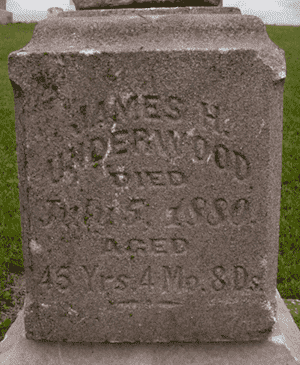
In the Early Days
In 1870, two physicians were located in West Bend: Dr. J.H. Underwood in 1863 and Dr. A.L. Day in 1868. The first physician to locate in Emmetsburg was Dr. J. J. Whitney in 1871. He helped organize a 12-county Northwestern Iowa Medical Association. The first hospital in Palo Alto County was established in Ruthven by Dr. Baldwin and his partner Dr. H. M. Huston in 1892. There was no hospital in Emmetsburg or Spencer and their hospital provided the only advanced medical care in the area from 1907-1911. The Baldwin hospital was located near the railroad, and Dr. Harris, a Chicago surgeon, would board an evening train in Chicago and arrive in Ruthven the next day for with a full day of surgery.
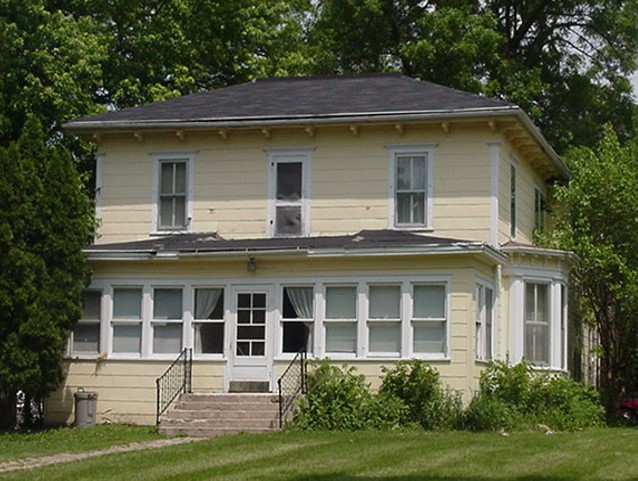
1920
Palo Alto Memorial Hospital is Established
In 1920, a committee obtained $4,245 of funding from the Red Cross. This money, with additional contributions, purchased the "Old McCormick" house located at 7th Street and Monroe for $6,500. Palo Alto Memorial Hospital opened for inspection on Decoration Day 1921. Alterations with rooms and equipment were furnished by local organizations. The hospital had a kitchen, one operating room, nine patient beds, and two bassinets. Money was always a pressing matter for the hospital. Original rates were $5.00 a day or $35.00 per week. Obstetric delivery was set at $5.00 plus $1.00 per day for the care of the baby. During the depression, rates were lowered to $4.00 per day.
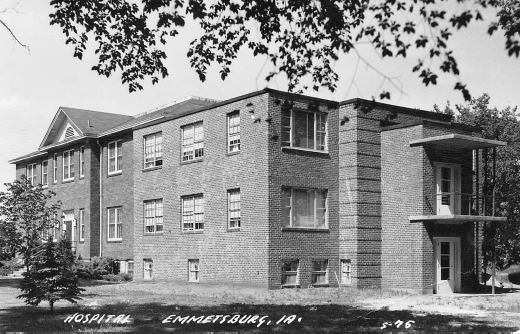
1940
Palo Alto Memorial Hospital Moves to a larger Location
By the late 1930s, the converted McCormick house was becoming too small for its usage. In December 1938, the town voted to purchase vacant East Side School for $100 plus $15 election expense. This location was at 10th Street and Grand in Emmetsburg. The hospital increased to 22 beds, 6 bassinets, and an elevator. By 1944, patient admissions were 1,152 for the year with 245 births. The addition of a south wing in 1948 added 11 more beds to the first floor as well as three beds, a nursery, a labor room, and a delivery room to the second floor. An administrative wing was added in June of 1959. By 1963, the hospital was very overcrowded with patients almost routinely seen placed in the halls when beds were full. The state made it clear that the over-crowded conditions would put future licensing in jeopardy.
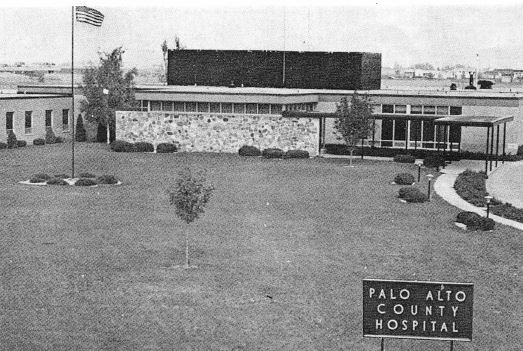
1963
Palo Alto County's new "Million Dollar Hospital"
On October 25, 1963, 85 percent of the almost 5,000 voters in Palo Alto County voted YES to the $500,000 bond issue to build a new hospital. Additional funds for the hospital came from the Hill Burton Act, personal donations and pledges, cash on deposit, a building fund, and assets from the old hospital. A groundbreaking was held in July 1964. On November 1, 1965, the Palo Alto County Hospital officially opened its doors.
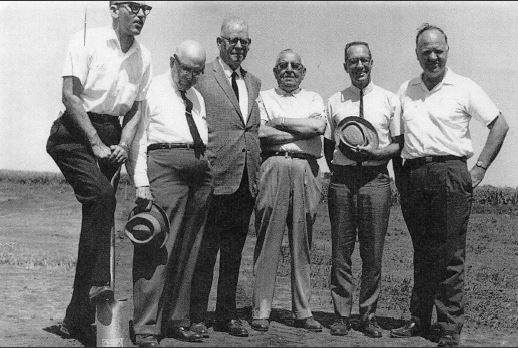
1977
Palo Alto Memorial Hospital is Established
Due to expanding outpatient services, the Palo Alto County Hospital Board of Trustees voted to construct and addition to the hospital. This addition provided expanded emergency services, an expanded radiology department and laboratory, and a health education room.
1980
Medical Clinic Built in West Bend
After a four-year absence of a physician in West Bend, Harry W. Frederick, DO opened the doors of the West Bend Clinic on Monday, August 4, 1980. This new clinic came about with the dedication and hard work of the citizens of West Bend. A committee of West Bend residents was formed in 1976 to find a replacement for Dr. W.J. Morrison who served the community's medical needs for 35 years before his retirement. In 1978, Dr. Harry W. Frederick and his wife Marjorie visited West Bend and worked with the committee to promise to practice in the community for five years in return for help with school loans. The committee raised money to build a clinic for the practice with the labor and materials largely donated by the citizens in the community.
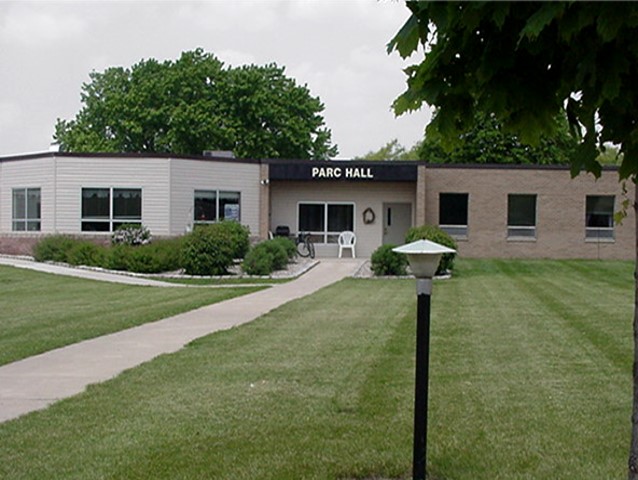
1986
PARC Hall
Due to advancement in medical procedures and changes in medicine, which resulted in shorter hospital stays, one of the two hospital patient wings closed and was converted to a long-term care facility. In 1986, this 22 bed facility was opened and named PARC Hall.
1988
Specialty Clinics Offered at PACHS
The need for additional offerings in the outpatient area continued to grow and in 1988, Palo Alto County Health System began offering specialty clinics so patients could see specialist in Emmetsburg, eliminating the need to travel out of the county. This also increased utilization of the hospital by using lab, radiology services, and surgeries at the local hospital. The first specialty clinics were held for surgery and urology. Cardiology clinics soon followed. Over the years the specialty clinics have increased and now offer a variety of specialty services.
1990
25th Anniversary spurs Capital Campaign – Palo Alto County Health Care Foundation
The 25th Anniversary Celebration of Palo Alto County Hospital prompted discussion on how to ensure quality health care services in Palo Alto County for future generations. The "Commitment to Tomorrow' campaign was launched in November 1990 with the goal to raise $1 million for a permanent foundation where only the interest could be used, not the principle. The campaign reached its goal with generous donations from employees, county residents and businesses. Today (September 2015), the Foundation has gifted over $2 million to the hospital and other health care related activities within the county while still retaining its original endowment.
1992
Medical Clinics
Graettinger Medical Clinic was established by the hospital in 1992 to provide health care services to the residents of Graettinger and surrounding areas. This primary care clinic was well received by the town of Graettinger, which was a supportive partner in making the clinic a reality.

1994
PACHS Partners with Mercy Medical Center- North Iowa
Palo Alto County Hospital became a partner with the Mercy Medical Center – North Iowa on September 1, 1994. The hospital's Board of Trustees signed a management contract with Mercy, which made available a variety of management services including assistance with long-range planning, staff development and training, and physician recruitment and retention. This affiliation created new possibilities for training and education, networking and specialists. Another benefit to this affiliation was the ability to apply for grants as a network. One of these grants provided the network hospitals with the ability to purchase telemedicine equipment. Telemedicine allows a patient to remain in Emmetsburg and talk with a medical provider at another location over a secure system. It also allows for additional educational programs or meetings over a large network of hospitals.
1994
Community Health Services
In July 1994, Public Health, Home Health and Hospice services merged with the Hospital and became Community Health Services, which expanded hospital and health services to patient homes and businesses. Due to this merger, additional offerings of the hospital included immunization clinics, school nursing services, professional nursing services in the patient's home including Hospice, maternal/child care services, and health and educational classes.

1995
Private OB & Hospice Room Are Added
In 1995, Palo Alto County Health System embarked on a remodeling project offering privacy, comfort and new technology in various patient areas. In the OB department, the rooms were remodeled to private rooms with more of a home-like setting for new moms. This included giving the rooms a facelift with floral prints, new wall and floor coverings, and purchasing rocking chairs. The need arose for a Hospice Room to accommodate patients who needed a higher level of care than they could receive at home. An acute care patient room was remodeled into a private room for Hospice patients and their families. This room included a more home-like setting, with amenities such as a fold-out couch for family members wanting to stay the night. This construction project also included facelifts for an outpatient waiting room, a new sterilization room in surgery, a surgical waiting room and new state-of-the-art heart monitors. The Palo Alto County Hospital Auxiliary contributed to the remodeling and furnishing of the outpatient and surgical waiting rooms.
1996
Physician Hospital Organization
Three health organizations united in partnership to form a new management service organization to manage and operate two of the physician clinics in Palo Alto County. Palo Alto Affiliated Medical Services (PAAMS) encompassed the physician offices of the Graettinger Medial Clinic and the Emmetsburg Medical/Surgical Clinic. Palo Alto County Health System, Trinity Health System in Fort Dodge, and North Iowa Mercy Health Center in Mason City formed a new management service organization to manage and operate PAAMS. This relationship was one of the first such efforts in Iowa and was used as a model to be replicated by others. This new organization helped insure Palo Alto County could compete for physicians and other health care services insuring quality health care to the county for the future.
1997
24 Hour On-site Coverage in ER
On August 1, 1997, Palo Alto County Hospital Physicians began a new physician on-call schedule at the hospital to coordinate after-hours care for patients. Physicians in each clinic worked together to coordinate after-hours calls and emergencies. The on-call physician stayed in or near the hospital at night, resulting in a quick response time for emergencies.

1998
Willow Ridge
The continuum of care was further enhanced by the announcement on September 30, 1997, of plans to build a two-story apartment complex for seniors. Willow Ridge was completed in 1998 and a grand opening celebration was held on March 14, 1999. The independent senior living community offered 30 apartments (now 28 apartments) for seniors who remain active and independent but enjoy additional amenities the senior living complex provides.
1998
New Medical Clinic is Built
In 1998, Palo Alto County Health System embarked on a $9 million expansion project which focused on building a new 14,000-square-foot medical office building with a shared entrance with the hospital, and a 17,000-square-foot addition for expanding outpatient services. This project included remodeling and additions of an in-house CT scanner, space for drug and alcohol testing, expansion for specialty clinics in the ER, and remodeling of the business office and registration. The building of the new medical clinic not only brought all the Emmetsburg physicians into a shared office building, but also improved services to patients who only had to go down the hall for hospital services such as radiology and lab. Physicians also had easy access to respond to emergencies just down the hall in the ER.
1999
PACH Purchases Medical Clinics
In January of 1999, Palo Alto County Health System purchased the Trimark Physician medical offices in Emmetsburg and West Bend. This purchase continued the efforts to provide integrated physician and hospital services for Palo Alto County. Through this agreement, Palo Alto County Hospital would provide the medical facilities and employ the clinic staffs. North Iowa Mercy Health Center in Mason City would be responsible for recruiting, employing and managing all physicians as part of the Physician Hospital Agreement with Palo Alto County Hospital.
2003
Medical Clinics Re-Named
On July 1, 2003, all three of the Palo Alto County Health System clinics were renamed Family Practice Clinic, designated by town. The name change helped to show a unity among the clinics as a part of the same system of care.
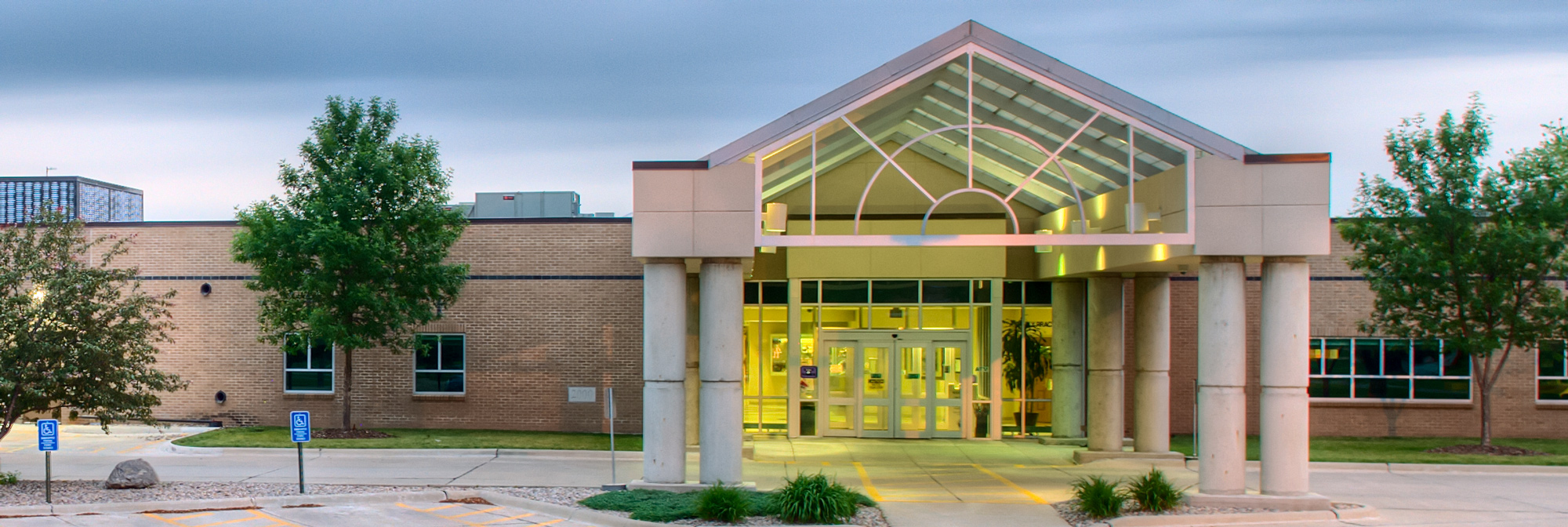
2006
Groundbreaking For $11 Million Construction Project
A groundbreaking ceremony in October 2006 was the accumulation of three years of discussion and research on the financial, mechanical and strategic issues facing the Palo Alto County Health System. The Board of Trustees unanimously voted for a construction and remodeling project which included private rooms for acute care patient wing and PARC Hall residents, renovations in outpatient surgery and dietary department, and significant improvements in heating, cooling and energy efficiency. During the construction project, additional projects were added including expansion of specialty clinic space, expansion and improvement of efficiencies in the surgical department and business office, and the construction of a permanent office for Community Health Services. A grand opening of the completed project was held Thursday, May 6, 2010.
2015
Construction Begins at PACHS/New Electronic Health Record for Clinic & Hospital
On May 8, 2015, Palo Alto County Health System held a groundbreaking for a $9 million construction/remodeling project. Highlights of this construction project included a new welcome desk and private registration rooms for the hospital and clinic. Due to the new electronic health record, CommunityWorks, storage space for paper medical files, was replaced with offices and space for new services such as health coaches. The emergency room was designed for more efficiency, patient privacy, and security. Rehabilitation was remodeled with higher gym ceilings and a therapy pool. A larger health ed room for community and staff education, and facelifts in Radiology and the Auxiliary Gift Shop were also a part of the project.
2018
PACHS Rebrands with New Colors, Logo and Promotes a "New Day" for Healthcare in Palo Alto County
Addition of Total Knee Replacement Procedures / Behavioral Health / Medically Orientated Gym Pruitt / Mental Health Counseling / MOG
2019
Mercy Health Network Becomes MercyOne
Mercy Health Network, one of Iowa’s largest organizations with more than 20,000 employees, officially changed its name and unveiled a new brand — MercyOne. The Des Moines-based health system’s rebranding reflects the organization’s significant growth over the last 20 years and is a key step in connecting its many points of care across the state and surrounding regions, the organization said in a release. The regional health system’s hospitals and clinics currently operate under 16 different brands. Bob Ritz, president and CEO of MercyOne, said the effort will make it easier for consumers to identify care locations, enhance the coordination of medical expertise and services, and ensure consistent patient care experiences across all locations. “We are excited to bring our mission and vision to life with the unified brand,” Ritz said in a statement. “Becoming MercyOne allows us to be more recognizable to the people and communities we serve and celebrates the remarkable work of teams across the state to build a better-connected system of care and services.” With the new brand, MercyOne’s 18 owned and joint venture medical centers and hospitals, as well as its network of family and specialty clinics and related care facilities, will modify their names and adopt the new logo. New names will now link facilities regionally to the communities served.
Leadership
PACHS Senior Leadership Team
Jonathan Moe
CEO
Kasey Sandbulte
Clinic Administrator
Collette Johnson
Chief Financial Officer
Sara Travis
Chief Nursing Officer
Melissa Studer
Chief Aging Services Officer
Ted Collins
Human Resources Director
Pachs Leadership Team

Jared Ball, LISW
Director of Behavioral Services

Sarah Strohman, RN, BSN
Director, Community Health
Amy Doocy
Director of Environmental Services
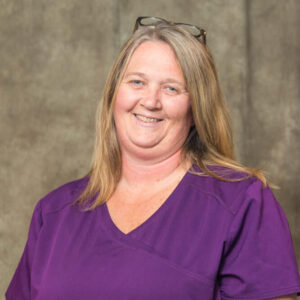
Marci Simington, RN
Lead Nurse Family Practice Clinics
Brandi Nelson
ER/Surgery Director

Jarid Kuchenreuther
Director of EMS
James Hanson
Maintenance Manager

Liz Reedy
Inpatient Services Director
Kellina Birkey
Laboratory Director

Tricia Willeford, PT
Director of Rehab Services
Tammy Chapman, RDN, LD
Director of Nutrition Services
Tatum Fulkerth
Patient Access Specialist | Patient Access Manager

Coleen Ruddy
Patient Financial Services Director | Compliance Officer

Sheryl Mortensen
Pulmonary, Cardiac & Respiratory Therapy Director
Della Coleman
Purchasing Director

Robert Radvansky, RN
Infection Prevention | Risk Management | Quality Assurance

Jeanette Mace
Radiology Director
Anna Merideth
Marketing and Foundation Director
Tara Helle
HIM/IT Manager
Board Of Trustees
Rick Brennan
President
Melanie Flynn
Secretary
Cindy Magee
Treasurer
Mark Hobart
Mikel Jones
Mary Cooper
Nick Steinkamp
A publicly-elected, nonpartisan seven-member Board of Trustees oversees the operation of Palo Alto County Hospital. Elected during a general election to serve four-year staggered terms, the Trustees represent the interest of Palo Alto County residents. The board meetings are normally held the fourth Wednesday of each month at the hospital.
Quality & Safety
Our Dedication To Quality & Patient Safety
Palo Alto County Health System uses care guidelines based on the best available medical research along with collaboration and teamwork among the medical and surgical specialists within the Mercy Health Network. These guidelines are also referred to as “evidence based medicine” or “best practice guidelines.” Utilization of our Electronic Health Record begun in 2008 and allows information to be securely shared amongst physicians and non-physician providers at any time.
National Quality Priorities
Our electronic medical record further improves patient safety by checking for drug interactions and using “order sets” based on “best practices”.
Patient Safety
Patient safety is defined as providing reliable, effective care to prevent harm, injury, and preventable death to all patients in our organization. Every patient has the right to expect that their care will be appropriately provided in a safe manner by competent staff in a safe environment. Your care and safety are our priority.
Patient Satisfaction
Integrity & Compliance
MercyOne Integrity and Compliance Program has established a system-wide Integrity and Compliance Program to assist all colleagues in understanding and following the laws, regulations, professional standards and ethical commitments which apply to our organization.
Why is it called an Integrity & Compliance Program?
MercyOne is not only concerned with compliance to laws and regulations but also with behaviors and actions consistent with our Mission and Values.
Compliance asks the question,
"Can we do this?"
Integrity asks the question,
"Should we do this?"
MercyOne’s Integrity & Compliance Program provides our colleagues, medical staff, vendors and other business partners with resources to assist them in meeting applicable legal, ethical and professional responsibilities in MercyOne. One key resource is MercyOne’s Code of Conduct, which describes expected behaviors and conduct of all who work in MercyOne and provides appropriate responses to common issues that are often encountered in the workplace.
MercyOne Supplier Code of Conduct
The Supplier Code of Conduct communicates the minimum standards by which all MercyOne vendors are expected to conduct themselves when providing goods or services to our system. Other key components include education and training, auditing and monitoring MercyOne business activities, and mechanisms which allow colleagues, medical staff, vendors and other business partners to raise issues and concerns so they may be dealt with timely and appropriately.
-
Education & Training
All newly hired MercyOne colleagues are required to attend an orientation session on the Integrity & Compliance Program and are provided education on our Code of Conduct. The information is reinforced through ongoing education and training, particularly for colleagues whose positions require additional knowledge and understanding of the laws and regulations which apply to their work responsibilities.
-
Reporting Issues & Concerns
Delivering health care services is an increasingly challenging task with complex and ever-changing rules and regulations which apply to our operations. As a result, there are times when the answer to a particular issue or situation may not be clear. MercyOne encourages colleagues, medical staff, vendors and other business partners as well as our patients to seek answers to their questions or concerns through various resources and options made available to assist them.
The Integrity & Compliance Line is staffed 24 hours a day, seven days a week by an outside company on behalf of MercyOne. An online system is also available through the Integrity & Compliance Line for those who prefer to submit their concerns in writing. The hotline number and website information are available for colleagues, medical staff, vendors and other business partners as well as our patients.
-
MercyOne Integrity & Compliance Officer
Our Integrity and Compliance Program is structured to encourage collaborative participation at all levels of our organization. The MercyOne Board of Directors has delegated program oversight responsibilities to the Integrity and Compliance Committee of the Board. A Corporate Integrity and Compliance Officer was appointed by the Board to oversee the development and implementation of the Program, including policies, procedures, standards and job aids designed to assist MercyOne and our colleagues and business partners in achieving compliance. Each MercyOne Network Participant and Network Managed Hospital also has an appointed Compliance and Privacy Official to oversee their programs.
For a list of our Integrity & Compliance Officials and Privacy Officials
Our Mission, Vision, Cultural Beliefs & Values
Our Cultural Beliefs Direct Us
-
Be One
I benefit from and strengthen PACHS and MercyOne
-
Personalize Care
I own my actions to deliver our key results
-
Own It
I own my actions to deliver our key results
-
Improve Daily
I make improvements every day for those we serve including each other
-
Innovate
I imagine and embrace bold new ideas to revolutionize health
Our Values Guide Us
-
Reverence
We honor the sacredness and dignity of every person
-
Integrity
We are faithful to who we say we are
-
Commitment to the Poor
We stand with and serve those who are poor, especially the most vulnerable
-
Compassion
Solidarity with one another, capacity to enter into another's joy and sorrow
-
Excellence
Preeminent performance, becoming the benchmark, putting forth our personal and professional best
-
Justice
We foster right relationships to promote the common good, including sustainability of the Earth
-
Stewardship
We honor our heritage and hold ourselves accountable for the human, financial, and natural resources entrusted to our care
Our Vision Calls Us
PACHS vision is to deliver innovative, personalized lifecare services.
Our Mission Defines Us
PACHS mission is to serve your wellness and lifecare needs with compassion and respect.
Community
We partner with these communities to bring you the best possible care.